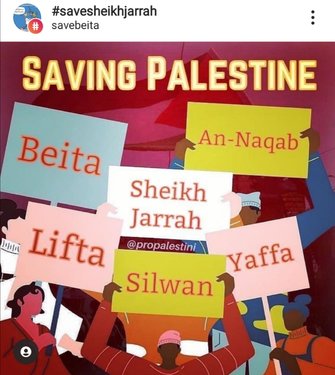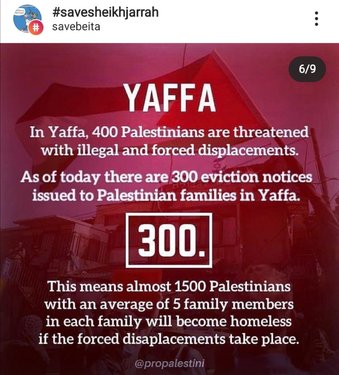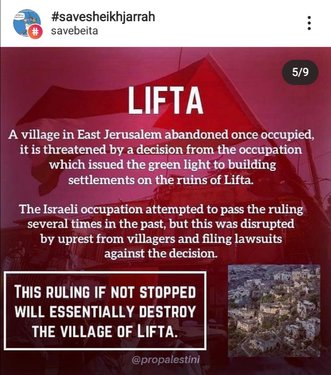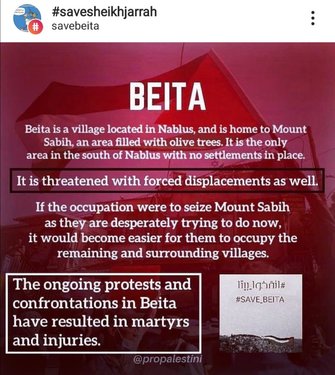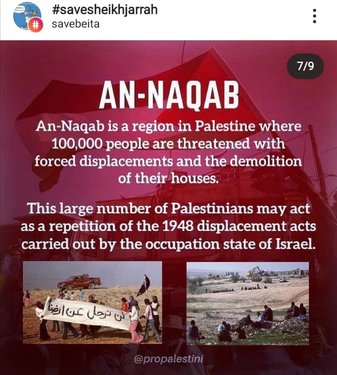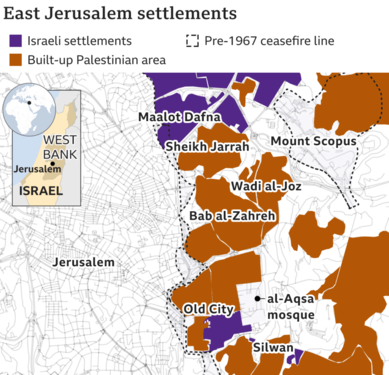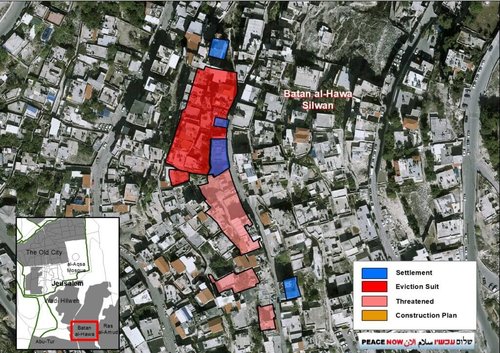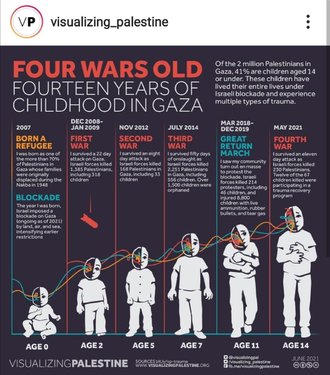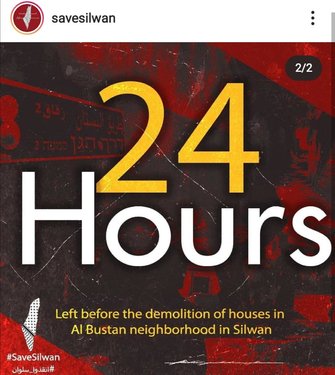-
Posts
8,434 -
Joined
-
Days Won
771
Content Type
Profiles
Forums
Events
Everything posted by ummtaalib
-
Only if your friend is a Scholar. We have a forum here for other Madhaahib and it would be good to post some main Fiqh of the Maliki, Shafi'ee and Hanbali Madhaahib
-
Are you a scholar? May I ask if you are familiar with Maliki fiqh? Especially women's rulings?
-
Assalaamu 'alaykum warahmatullah Welcome to the forum! Jazaakillahu khayran for posting, please continue posting beneficial content. It will be helpful if you mention the source of the information or in this case the name of the book. May Allah ta'ala make us from those who strive against the lower self and attain beautiful akhlaaq
-
"My bed was there" My bed was there, says 4 yr-old Palestinian child left with just rubble: ethnic cleansing in instalments is still ethnic cleansing . To those who practice "Out of sight, out of mind"... could you take just one second to imagine if this was your son and your home? What is the psychology of a child showing his room in his destroyed house? A system where even children's rights are stolen, Institutions, states and the media unconditionally support cruel oppressors but replace the story with fabricated one. So people continue in asleep. Our Voice Matters (@our.voicematters) • Instagram photos and videos
-
Shame on Bahrain!! Shame on Morocco & Sudan!! 29 June 2021 Bahrain announced on Tuesday that it had officially appointed the kingdom’s first ambassador to Israel. Bahraini state media said that Khaled Yousef al-Jalahmah would serve as Bahrain's envoy to the State of Israel, and was congratulated on the position by the country's monarch. Jalahmah previously served as the deputy ambassador to the United States and had also held several other senior positions in the Bahraini diplomatic service. The announcement came after Bahrain agreed to normalise ties with Israel in September last year, alongside a number of other countries in the region, including Morocco, Sudan and the United Arab Emirates (UAE). Although Israel already has an embassy in the Bahraini capital Manama, the kingdom is yet to establish an embassy in Israel. Source
-
Isr*el demolished the home of Al-Abasi family. This is the second demolition in #Silwan today. Friends Of Al-Aqsa (@friendsofalaqsa) • Instagram photos and videos
-
UAE welcomes Israel’s Foreign Minister Yair Lapid As we stand united against the colonisation of #Palestine, the #UAE welcomes Israel’s Foreign Minister Yair Lapid, with open arms, normalising the war crimes currently committed against the Palestinians of #Silwan. He is the first Israeli Minister to officially visit the UAE. Lapid is scheduled to open Israel’s first embassy in Abu Dhabi, as well as consulate within #Dubai. The foreign minister is then expected to sign a number of trade agreements, designed to increase the level of economic cooperation, in spite of the fact that #Israel recently indiscriminately killed a minimum of 256 adults Inc at least 66 children in #Gaza. This also comes after recent attacks by Israeli forces on Al-Aqsa mosque. 🔴 #FOA stands strongly against the normalisation with Israel as well as the colonisation of Palestine! Friends of AlAqsa Friends Of Al-Aqsa (@friendsofalaqsa) • Instagram photos and videos Shame on UAE!
-
Isr*eli occupation policeman brutally assault and beat up Mr. Nedal Rajabi after demolishing his commercial store in Al-Bustan neighborhood in the town of Silwan, occupied Jerusalem, today. Warning: Brutal assault on people trying to defend their basic human rights www.instagram.com/p/CQsgobLnJY-/
-
An Israeli bulldozer demolishing a shop in Silwan village Eye On Palestine on Instagram: "🇵🇸#Palestine || An Israeli bulldozer demolishing a shop in Silwan village. جرافة تابعة للاحتلال تهدم محل تجاري في قرية سلوان" The Israeli occupation forces brutally assaulting and beating the residents of Silwan village while they were trying to prevent the occupation forces from demolishing a shop in the village. Warning: sensitive content Eye On Palestine on Instagram: ". The Israeli occupation forces brutally assaulting and beating the residents of Silwan village while they were trying to prevent the…"
-
Palestinians are being displaced in many other places So where are the Palestinian voices in mainstream media?
-
In Jerusalem’s Silwan, Israeli settlers wage another battle to takeover Palestinian homes For decades the Batn al-Hawa neighborhood in Silwan has been the target of a relentless campaign by settler organizations to forcibly expel Palestinian residents of the neighborhood and replace them with Jewish settlers -- a process that is entirely legal under Israeli law. By Yumna Patel June 9, 2021 By now, you’ve probably heard of Sheikh Jarrah and the struggle by the neighborhood’s Palestinian residents to save their homes from being taken over by Israeli settlers. The fight to save Sheikh Jarrah has garnered international attention in recent weeks and has prompted widespread protests across Palestine and the entire world. But just a few kilometers away another group of Palestinian families are facing an almost identical battle. Five kilometers away from Sheikh Jarrah, right outside the Old City in occupied East Jerusalem, is the village of Silwan. Silwan lies at the heart of East Jerusalem, and is home to an estimated 60,000 to 65,000 Palestinians. It’s also one of the most heavily targeted areas in Jerusalem for Israeli settlement activity, and what rights groups have called Israel’s attempts to “Judaize” the city. Just south of the Al-Aqsa mosque compound is the Batn al-Hawa neighborhood of Silwan. For decades Batn al-Hawa has been the target of a relentless campaign by settler organizations to forcibly expel Palestinian residents of the neighborhood and replace them with Jewish settlers — a process that is entirely legal under Israeli law. You’re probably wondering, how is this even possible? In short, a right wing settler organization by the name of Ateret Cohanim has been seeking to forcibly evict some 100 families from Batn al-Hawa under the pretext that the land was previously owned by Jews more than 100 years ago. Through a series of legal mechanisms sanctioned by the Israeli courts, Ateret Cohanim has been filing eviction orders against the families in Batn al-Hawa since 2002, with the goal of putting Jewish settlers in their place. And while Israeli law allows for property to be transferred to Jews who claim previous ownership from before the establishment of of Israel, that same right is denied to Palestinians who were dispossessed from their homes during the Nakba in 1948. https://mondoweiss.net/wp-content/uploads/2021/06/Add-a-heading-1024x858.png To date, Ateret Cohanim has already taken control of six buildings in Batn al-Hawa, comprising 27 housing units. Units that once belonged to Palestinian families. In the Batn al Hawa neighborhood alone, Ateret Cohanim has ongoing legal proceedings to evict 81 Palestinian families, numbering 436 people. Since 2015, 14 families in the neighborhood have already been forcibly evicted. And that’s just in Batn al-Hawa. In several other neighborhoods within Silwan, other settler organizations are also seeking to evict more Palestinian families, while the Israeli government has placed dozens of demolition orders on Palestinian homes in order to make way for an archaelogical tourist park and nature reserve. So, where does that bring us today? Well, in 2020, the Jerusalem Magistrate Court. ordered the eviction of seven more Palestinian families in Batn al-Hawa. Two of those families were due to have their appeal cases heard on May 26th, but the Israeli court postponed its decision. Despite the postponement the seven families, who number 108 individuals, are still under imminent threat of displacement. And they’re not alone. According to a 2020 survey by the UN Office for the Coordination of Humanitarian Affairs, at least 218 Palestinian households in East Jerusalem, numbering 970 people, and over 400 children, have eviction cases filed against them. Most of those cases were initiated by settler organizations like Ateret Cohanim. Amnesty International and other human rights organizations have called on Israel to scrap the eviction plans in Silwan, saying that such forced evictions are flagrant violations of international humanitarian law that amount to war crimes. As their forcible displacement looms, Palestinians in Sheikh Jarrah and Silwan are asking the world to stand up against Israeli Apartheid, and are calling on people to continue bringing attention to their case on social media using the hashtags #SaveSheikhJarrah and #SaveSilwan. Source
-
‘It is a Nakba’: Campaign to save Sheikh Jarrah builds momentum as forced displacement looms In a matter of just two weeks, six Palestinian families, numbering 27 people, will be thrown out of their homes and into the street, and replaced with Israeli settlers. The fate of the families from the Sheikh Jarrah neighborhood in occupied East Jerusalem is essentially set in stone: an Israeli district court rejected their appeal in February this year, ordering them to vacate their homes by May 2, 2021. Another appeal filed by seven other families in Sheikh Jarrah, numbering 31 people, eight of them children, was rejected by the same Israeli district court in March, and the families were given until August 1, 2021, to evacuate their homes. If the families do not leave their homes, where they have lived for the better part of 65 years, they will be forcibly removed by armed Israeli authorities, just like their neighbors before them. The only hope left for the el-Kurd, al-Qasim, Skafi, and al-Ja’ouni families to save their home from being taken over by Israeli settlers in the next two weeks, is an appeal to the Israeli Supreme Court — a court that has a long history of upholding Israeli settler colonial projects in places like Jerusalem, over the rights of the city’s Palestinian residents. Over the years, dozens of the families’ relatives, friends, and neighbors have been evicted and replaced with Israeli settlers, as per Israeli court orders. In 2002, 43 Palestinians from the neighborhood were forcibly evicted after losing a legal battle to the Israeli settlers; in 2008, videos of the al-Kurd family having half their home being taken over by a group of settlers made international headlines; in 2009, the Hanoun and Ghawi families were kicked out of their homes; and in 2017, the Shamasneh family faced a similar fate, as the eight family members, including 75-year-old Fahamiya Shamasneh and her 84-year-old husband Ayoub were removed from their home. The looming deadline for the May 2 eviction is one that’s weighing heavy on 22-year-old writer and poet Mohammed el-Kurd, who was just 11 years old when his family had their belongings thrown into the street, and half of his home was taken over by a group of Israeli settlers. Mohammed el-Kurd is a Palestinian writer and poet, and native of Sheikh Jarrah. (Photo: Multitude films) “I remember all the Israeli police forces that were there that day, shooting sound bombs and beating up people that were trying to resist them,” el-Kurd, who’s currently based in New York City, told Mondoweiss. “They had completely shut off the neighborhood to the rest of the city, no one was allowed in or out.” El-Kurd says he still has vivid memories of scenes of Palestinians being arrested in the dozens, as Israeli settlers threw his family’s furniture into the street, and moved themselves into a section of his home. “I remember, they threw out the stuff that they didn’t want, and whatever they wanted of our belongings, they just kept it,” he said. One of the pieces of furniture that the settlers kept was el-Kurd’s baby sister’s crib, which he says the settler made a bonfire out of in the front yard the next day. To this day, all that separates the Israeli settlers from the el-Kurd family is drywall, and a clothesline hanging in the courtyard. In just two weeks, however, what little of their home they have managed to hold on to, could be snatched from them once again. “I was speaking to my neighbors recently, and I told them that I know this has happened to us before, but it’s still so shocking that on May 2nd, people are going to snatch us out of our homes again and throw us in the street. And there’s nothing we can do to stop them.” Read more here
-
Barbara Nimri Aziz – Global Research June 18, 2021 Residents of Sheikh Jarrah’s resistance to eviction by Israeli Jews evolved into a military confrontation so lopsided, the Israeli bombardments against Gaza so terrifying, it drew widespread condemnation (the US government excepted). The Palestinian dead, injured and homeless are still being tabulated, while eviction processes of Sheikh Jarrah’s Arab inhabitants continue, even as we learn of similar forced displacement of Arabs in nearby Silwan. Another Israeli scheme to dislodge Palestinians is home demolition—they number in the many thousands and continue (in Bustan, Silwan) even as I write. For a glimpse of these all-too-routine violations, I append my newly-digitized April 5, 1996 Christian Science Monitor article based on what I witnessed — I likened it to a lynching – when on assignment in the West Bank 25 years ago. “It’s quite a spectacle, a Palestinian home being blown apart. Furniture, dishes and clothes, hastily removed, are deposited helter-skelter in the path or road. Villagers stand by, silent and grim . Heavily armed soldiers are massed to prevent any disruption. Confused, awed children turn sullen. Americans rarely see Israel’s demolition policy at work; but it’s a regular form of punishment. All Palestinians, from toddlers to the elderly, are familiar with it. Perhaps it’s happened to a neighbor. Perhaps they themselves were hauled out of their house in the early morning and told by a soft-spoken Israeli officer, with his troops surrounding the residence, that he has his orders. The entire town is aroused. Neighbors join in the frantic rush to save some household items; they know it’s useless to protest. The silent frenzy of losing a home this way has no parallel. It’s not like a flood or a fire; it’s more like a lynching. There’s no one to call for help. Hundreds of soldiers surround the house and village to ensure no one interferes with the bulldozers and dynamite teams. Legalized destruction It’s all done legally too. That is to say, a paper, written in Hebrew, is presented to the householder spelling out the order to blow up or bulldoze his or her home, or to seal it. Often the order charges that the house lacks a building permit. Typically, a family has two hours’ notice. In a village near Hebron in 1991, I saw the remains of a mosque that was flattened weeks before. The land had been cleared because of some building infraction, neighbors told me. At other times, particularly during the intifadah (uprising), a family is informed that their son was caught (not convicted but simply picked up and charged) throwing a Molotov cocktail, or that he was captured in an attack on an Israeli. In some cases, only the family orchard (their livelihood) is leveled. Again, the family is notified when the machines are already on the nearby road. Orchards have been destroyed based simply on a report that some Palestinian children were hiding from soldiers among the trees, or Jewish settlers claim that someone they were pursuing was heading in that direction. During the first three years of the intifadah (1987-1991), when communal punishment was the norm for civil disobedience, the Palestinian Human Rights information Center recorded 1,726 demolitions or sealings of homes. On average, there are nine Palestinians living in a home; so those lost houses represent about 15,000 men, women and children, forcibly made homeless during that time. Often the dwelling is not even the family’s original home but a shelter inside a crowded refugee camp built with the help of United Nations funding. Israel says it demolishes certain houses because they’re the homes of “suicide bombers”. The news media, which remains silent about these actions, are effectively sanctioning the policy. So conditioned is the public that whatever is done to an “Islamist terrorist” seems justified and is endorsed. Are we right to stand by silently and accept that? Consider this: The demolitions are retaliatory actions that strike deep into the core of Palestinian identity. They are bound to have some traumatic effect on children. Such devastation may quell opposition temporarily, but the long-term effects may be very different. People may become more embittered and hostile towards Israeli authority. Blowing up the home of a family may in fact move the brothers and sisters of a dead man into closer identification with his actions. Israel does not respond in this manner to all heinous acts. Look at the assassination of Prime Minister Yitzhak Rabin by the Israeli law student. Look at Baruch Goldstein, the Hebron mass murderer. Their actions repelled most Israelis, yet their homes and families remained unharmed. No, these destructive acts are specifically designed for and executed against Palestinians. Palestinians’ view Palestinians see this type of punishment as another method Israel uses to “clear the land”, to deny their existence, to implement its “cleansing” policy. People deprived of a home may have one less link with the land. But such actions have other consequences. Children witness their homes, the places they were born, blown apart. They watch fathers and other male relatives helplessly held at gunpoint. They imbibe the horrified reaction of their mothers and grandmothers. The house as the center Because this form of punishment is so rare, few can imagine the impact of a house being blown up in front of its owners. We have to understand how central the house is to Palestinian life. Even today, most Palestinians are born at home. This is the place for daily prayer, for family meals, for weddings, for homecomings from jail, and for funerals. This is where everyone gathers to pass the evening. It is not a shelter; it is a community. It is the place for consolation and joy, the haven and the refuge. Mother is the manager, so the home is unequivocally associated with her power and protective role. Harming the house is like violating the mother. Many children will feel they must avenge this injustice. Especially with the world community standing by seeming to sanction the destruction, family members may feel more responsibility to seek justice. Anyone who understands this would advise Israel to cease this practice for these reasons, if not for moral ones.” Source
-
-
Palestinians live under two Occupations, the Israeli one, and the Palestinian Authority's regime that functions under the regulations of the Israeli one. These are ain't our representatives. For years our voice did not reach the world because they were the ones who pretend to be carrying it to the world, while in fact all what they have done is exploiting our struggle for their own benefits. The new generation is sick of these games, we want to live in dignity. ⚡Zeus⚡ (@adnan_barq) • Instagram photos and videos
-
Abbas critic Nizar Banat dies after raid on his home by PA forces Nizar Banat, a leading Palestinian activist and critic of the Palestinian Authority (PA), died early on Thursday (24 June 2021) after a raid by PA security forces on his home in Dura in the southern occupied West Bank district of Hebron. In a statement, Governor of Hebron Jibreen al-Bakri said that Banat's "health deteriorated during the arrest". However, Banat's family said he officers had beaten him during his detention. The arrest took place amid an ongoing security crackdown by the PA on political opposition and social media users in the West Ban Banat was well known for his criticism of the PA leadership and had been arrested several times in the past by Palestinian security forces. Thousands protested against Palestinian Authority in West Bank following Banat's death, which Lawyers for Justice described as an 'assassination' So what is the PA (Palestinian Authority)? The Palestinian Authority (or "PA" - which the Palestinians have renamed the "Palestinian National Authority" or "PNA") was created through the Oslo Accords of 1993 - a series of agreements concluded between the Palestine Liberation Organization (PLO) and Israel. The PA was created as an interim governing body while Palestinians and Israelis were negotiating a final resolution of their conflict - which should have occurred by 1999 under the accords. Still, the PA is treated as if it enjoyed a continuing legal mandate. In 2013, Mahmoud Abbas signed a decree changing the PA’s name to the State of Palestine, after the United Nations General Assembly voted in 2012 to recognize Palestine as an observer state. Despite this change, it is still commonly referred to as the PA. The PA was to take partial administrative and security responsibility over areas within the West Bank and Gaza Strip as Israeli troops withdrew from those areas. The two regions were subdivided into "A", "B", and "C" areas. In "A" areas, the PA has full civil administrative responsibility (i.e. running municipal governments, courts, schools, and other services), and was also responsible for security. In "B" areas, the PA has civil administrative responsibility, but shared security responsibility with the Israeli military. In "C" areas, Israeli military government exercises both civil administrative and security functions. The "A" and "B" areas contain the majority of the built-up areas and therefore most of the Palestinian population of the West Bank. However, the "A" areas, where the PA exercises sole security responsibility, has never exceeded more than 18% of the West Bank. In the Gaza Strip, "A" areas constituted about 70% of the region, prior to Israel's withdrawal in 2005. The PA lacks authority over Israeli settlers and settlements, borders, airspace, water, and a variety of other spheres. Israel reserves power to review and veto any PA legislation. Since the Oslo accords, the Israeli military has never controlled less than 59% of the West Bank, and, until the Gaza withdrawal in 2005, 30% of the Gaza Strip. The PA is led by a ra'ees (Arabic word meaning either "head" or "president") and the first ra'ees was Yasser Arafat, who received 88% of the vote in 1996. After Arafat's death in November 2004, Mahmoud Abbas was elected in January 2005, receiving 62% of the vote. Palestinians outside of the West Bank and Gaza Strip have not been allowed to vote in any PA elections. Palestinians in the West Bank (including East Jerusalem) and Gaza Strip also elected members of an 88-member Palestinian Legislative Council in 1996. The PLC is the main legislative body of the PA, and has been central in the campaign for democratic reforms of the PA. The most recent PLC elections occurred January 25, 2006 for an enlarged 132-member council. Following the elections, factional violence between Fatah and Hamas in 2007 left Hamas in control of governance in the Gaza Strip, with a Fatah-led PA functioning only in the West Bank. In April 2014, the two parties signed a reconciliation agreement and in June 2014 a new technocratic government was formed, reuniting the West Bank and Gaza Strip under the PA. Although created by the PLO, the PA appears to be eclipsing the PLO in political importance. Mahmoud Abbas is received abroad as either "President of the Palestinian Authority" or “President of the State of Palestine,” not Chairperson of the PLO Executive Committee. The PA has now held two presidential elections, two municipal elections, and two parliamentary elections. Meanwhile, the PLO's main policy setting body, the Palestinian National Council, has not convened since 1996. Many Palestinians are wary of this trend because the PA, unlike the PLO, only represents Palestinians in the West Bank and Gaza, but not the Palestinian refugees and Palestinian citizens of Israel. Some fear that Israel will offer the Palestinians limited sovereignty in the West Bank and the Gaza Strip, which might alleviate the acute suffering of the Palestinians in those regions, and therefore appeal to the PA's electoral constituency. It will not, however, address the concerns of Palestinian refugees and Palestinian citizens of Israel, whose voices are represented by the PLO. Source Also see here
-
-
Despite road closures, military presence and 4 dead, the "night confusion" by the "Torch unit" continues. Thier resilience is awesome www.instagram.com/p/CQjlMPMpBtm/
-
This is a must listen... Russel Brand Many of you wanted clarity on the subject of Palestine and the current conflict. This, from Holocaust survivor Dr. Gabor Maté (on my podcast Under The Skin) is the most beautiful and powerful testimony on this subject I’ve ever heard. From someone with deep connections to the history of this situation. https://youtu.be/WdPdslOTwJU
-
Making Du'a الدعاء سلاح المؤمن "The Dua is the weapon of the believer" Recorded on the authority of Sayyiduna Abu Hurayrah (radiyallahu ‘anhu), Sayyiduna ‘Ali (radiyallahu ‘anhu) and Sayyiduna Jabir (radiyallahu ‘anhu) in the following Hadith collections: Mustadrak Hakim, vol. 1 pg. 492 Musnad Abi Ya’la, Hadith: 439 and 1812



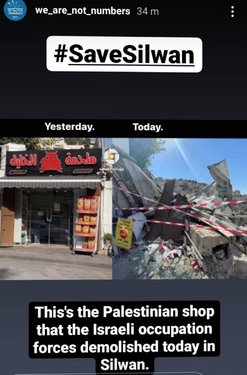
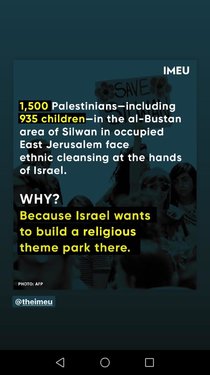
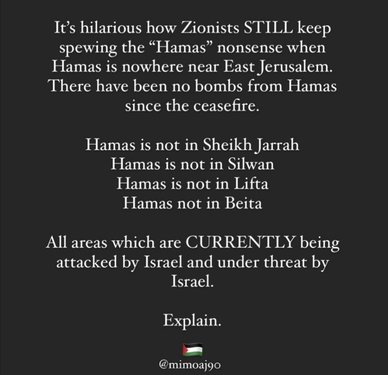
.thumb.jpg.4bbde5af0bb89c14961a85c0bd8312f6.jpg)
